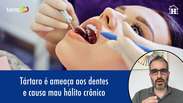Prevention is the best alternative to fighting tartar, since once it forms it can only be removed with outpatient procedures.
-
BY PARTICIPATING

Tartar is a threat to your teeth and causes chronic bad breath
-
BY PARTICIPATING

Exclusive: Gustavo Tubarão tells how he overcame depression
-
BY PARTICIPATING

What to change in your life now to prevent prostate cancer
The yellowish, hardened crusts that appear on the teeth have much more serious consequences than simple aesthetic damage. Known as calculus or calculus, these crusts are among the most common dental problems along with tooth decay and gum disease and can have serious consequences.
“By hindering adequate hygiene, tartar constitutes a sort of shield or protection for harmful bacteria present in the mouth, thus encouraging their proliferation with consequent damage to the dental structure, which can lead to the formation of cavities and gum disease. Furthermore, these bacteria release toxins that contribute to an inflammatory state of the oral cavity, thus predisposing to the onset of conditions such as gingivitis and, subsequently, periodontitis,” says Hugo Lewgoy, PhD of the Faculty of Dentistry of the University of São Paulo ( FOUSP) and scientific consultant of Curaden Swiss.
According to the expert, the main cause of the accumulation of tartar on the teeth is the neglect of correct oral hygiene, which is why it is such a recurring problem in dental practices.
“The formation of tartar, popularly known as calculus, can occur in the initial phase of the process of formation of the so-called oral biofilm or bacterial plaque. Initially, the saliva that wets the teeth forms a layer with mucus proteins – mucins and other proteins – called an acquired pellicle. This film provides a surface on which bacteria can initially adhere. The bacteria present in the oral cavity, mixed with food by-products, such as sucrose and other components originating from cellular debris that naturally flakes off from the oral mucosa, form a transparent film known as bacterial plaque or oral biofilm. This biofilm has multiple layers, adheres to the tooth surface and penetrates into the interdental regions and under the gums,” explains Hugo.
“Oral hygiene has the main objective of removing this bacterial plaque. But, when this does not happen, this plaque hardens and acquires a whitish or yellowish color, forming tartar or tartar. In some people, tartar can form directly from the acquired film – in the initial phase of biofilm formation -, but if there is tartar it is because, at a certain point, oral hygiene was not carried out in the most adequate way”, explains the specialist.
Once formed, tartar can only be removed in the office with scraping and cleaning procedures. Prevention, therefore, is always the best alternative, which can be implemented with some simple measures, as the specialist lists below:
Start with the basics
Daily brushing, two or three times a day, is the main treatment for eliminating bacterial plaque. But, to have maximum effectiveness, it must be carried out correctly and with suitable products. In the case of brushes, for example, it is important to opt for products equipped with a large number of ultra-soft bristles, such as the renowned 5460 Brush or the Curaprox Velvet Brush, which has 12,460 bristles in Curen, a finer and ultra-type fiber soft fiber, very effective and does not damage teeth and gums.
“While very hard bristles can wear away tooth enamel and worsen gum problems, the number of bristles is linked to the effectiveness of brushing: the more bristles, the less bacterial plaque that accumulates on the teeth,” says the dentist.
As for toothpaste, it is worth opting for products that have a formulation that offers additional benefits in terms of tooth protection. This is the case of Be You, Enzycal and Herbal Bliss toothpastes, formulated with dairy enzymes which carry out a bactericidal and antiviral action, helping to fight harmful microorganisms and also stimulating the protective function of saliva, which helps control bacterial plaque .
Furthermore, Unitufo 1006 and 1009 toothbrushes can also be used to control dental calculi, as they perfectly clean the gum margins and the gingival sulcus.
“Especially in the lingual region of the lower front teeth – central and lateral incisors of the jaw – we have a high incidence of calculi. The use of unitufo toothbrushes in this area always leaves the surfaces of the teeth smooth and shiny, preventing the formation of tartar.”
Turn to technology
According to Hugo, electric toothbrushes are proven to remove plaque more effectively than conventional manual versions.
In this sense, a great novelty are the so-called hydrosonic brushes, which generate an acoustic wave that causes powerful agitation of the liquids present in the mouth (water, saliva, biofilm and toothpaste).
“This is the so-called hydrosonic or hydrodynamic effect which, together with the movement of the bristles, favors the disorganization of the bacterial plaque,” explains the specialist.
An example is the Curaprox Hydrosonic Pro toothbrush, which has seven operating modes ranging from 44 to 84 thousand movements per minute and, at the maximum level, generates the formation of waves and microbubbles that meet the teeth, further promoting the disorganization of the oral biofilm also in places that are difficult to access.
In addition to the normal head, it is also equipped with a unitufo type head, excellent for use in the lingual region of the lower incisors, the main site of accumulation of dental calculi.
Clean the interdental region
The area located between the teeth is a point of great accumulation of bacterial plaque, as well as being the starting point of most cavities and gum disease. And, contrary to what many imagine, just using dental floss is not enough to remove oral biofilm and prevent the appearance of tartar.
“Despite being an excellent accessory for removing food debris, which can get trapped between the teeth, dental floss cannot adequately clean these areas, as there are irregularities and concavities that make it difficult to access. In these areas, interdental brushes are much more effective in disorganizing bacterial plaque,” explains Hugo Lewgoy.
Interdental brushes such as CPS Prime, from Curaprox, have ultra-fine, soft, long and flexible filaments with rounded ends to promote effective and gentle hygiene of all critical areas between the teeth.
«These toothbrushes easily reach the retention niches of bacterial plaque that are inaccessible to common toothbrushes and dental floss», he underlines.
Adopt a balanced diet
Hugo explains that, to avoid the accumulation of bacterial plaque on the teeth, it is important to avoid certain types of foods, especially those rich in sugars and carbohydrates, which significantly favor the production of oral biofilm in the oral cavity.
“Focus on a balanced diet instead. There are some foods that adhere less to the surface of the teeth and have an astringent effect, especially the more fibrous ones, such as watermelon, melon, cucumber, apple and strawberry. However, avoid sugaring them so that the effect is not the opposite. And remember that they also contain a type of sugar that can be metabolised by bacteria (fructose) and do not replace adequate oral hygiene”, advises the specialist.
Make regular visits to the dentist
While following all these precautions, regularly consulting a dentist is essential to check for the presence of tartar in the oral cavity and, if necessary, carry out a cleaning to remove it, thus preventing the onset of more serious pathologies. Furthermore, the specialist will be able to recommend specific treatments for your case.
“For example, people who have a high tendency to tartar formation or who have difficulty brushing their teeth correctly can be advised to use oral rinses, such as PerioPlus+ Balance, by Curaprox, which is able to fight a wide range of microorganisms and hinder the accumulation of oral biofilm without negatively impacting the dryness of the oral mucous membranes”, says Hugo Lewgoy, who finally recommends that visits to the dentist be carried out, indispensably, every six months.
Watch the video with tips Eduardo Sampaiodentist and periodontist, who talks about tartar.
inspires transformation in the world of work, in business, in society. Compass, a content and connection agency, is born.
Source: Terra
Ben Stock is a lifestyle journalist and author at Gossipify. He writes about topics such as health, wellness, travel, food and home decor. He provides practical advice and inspiration to improve well-being, keeps readers up to date with latest lifestyle news and trends, known for his engaging writing style, in-depth analysis and unique perspectives.








